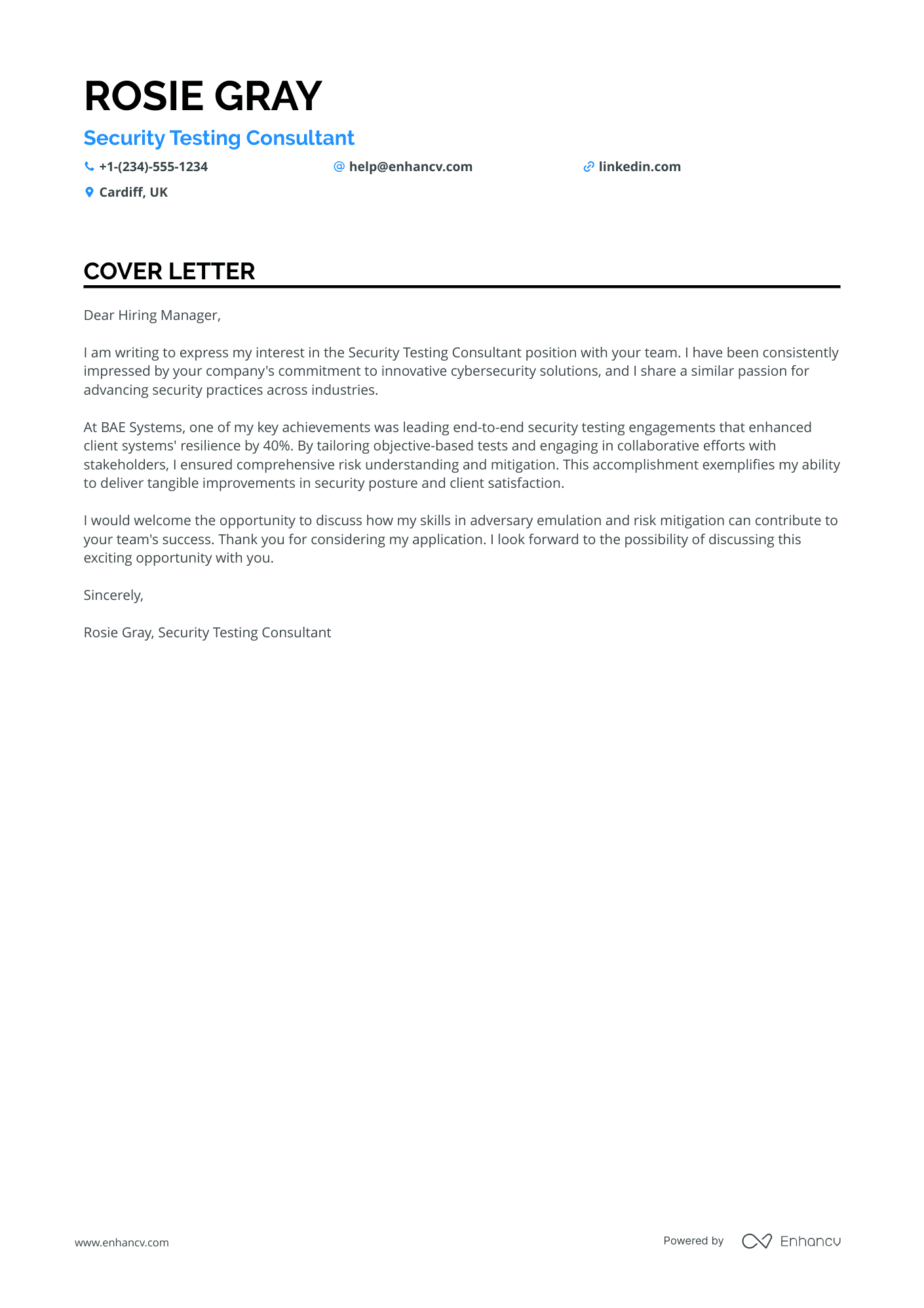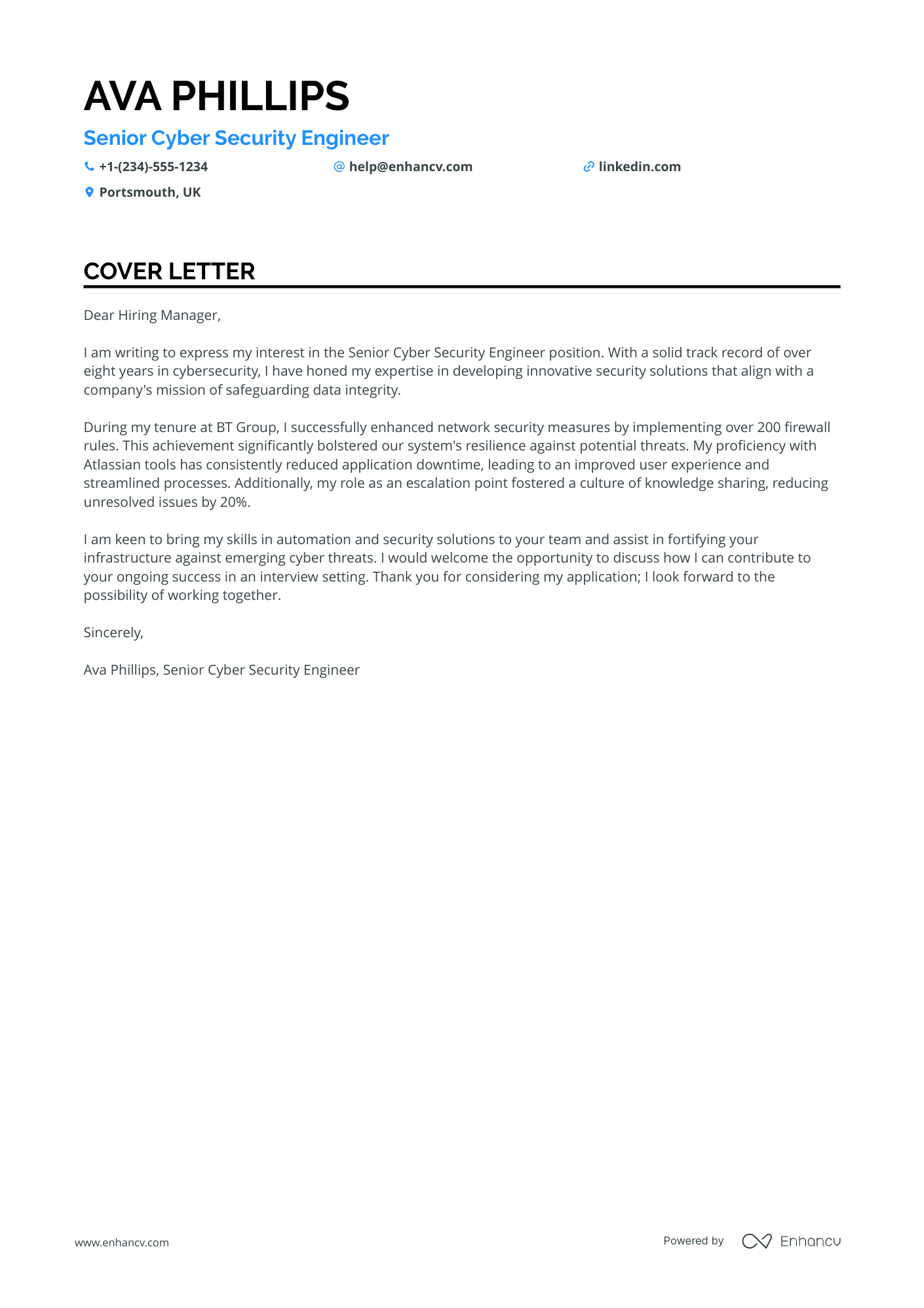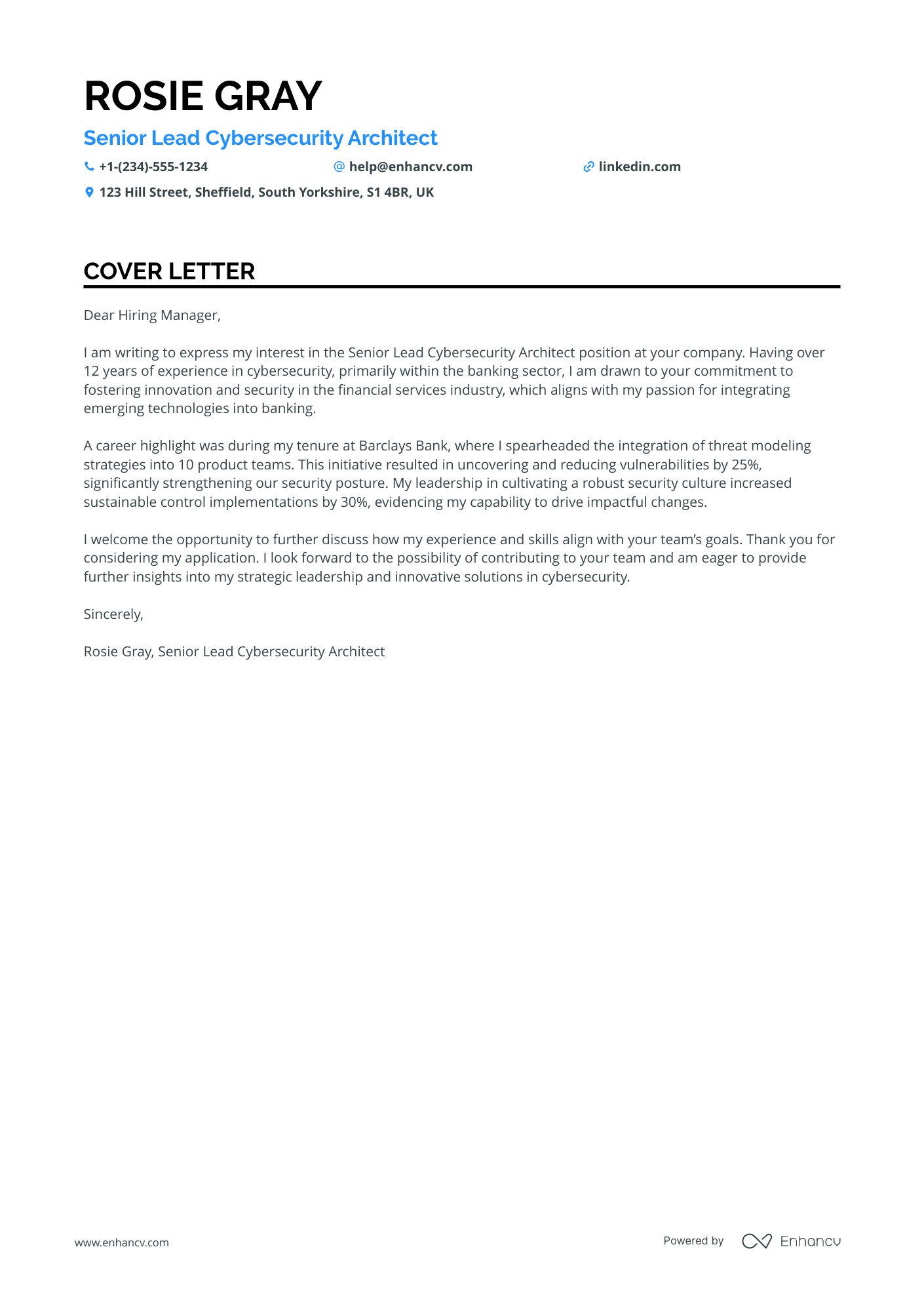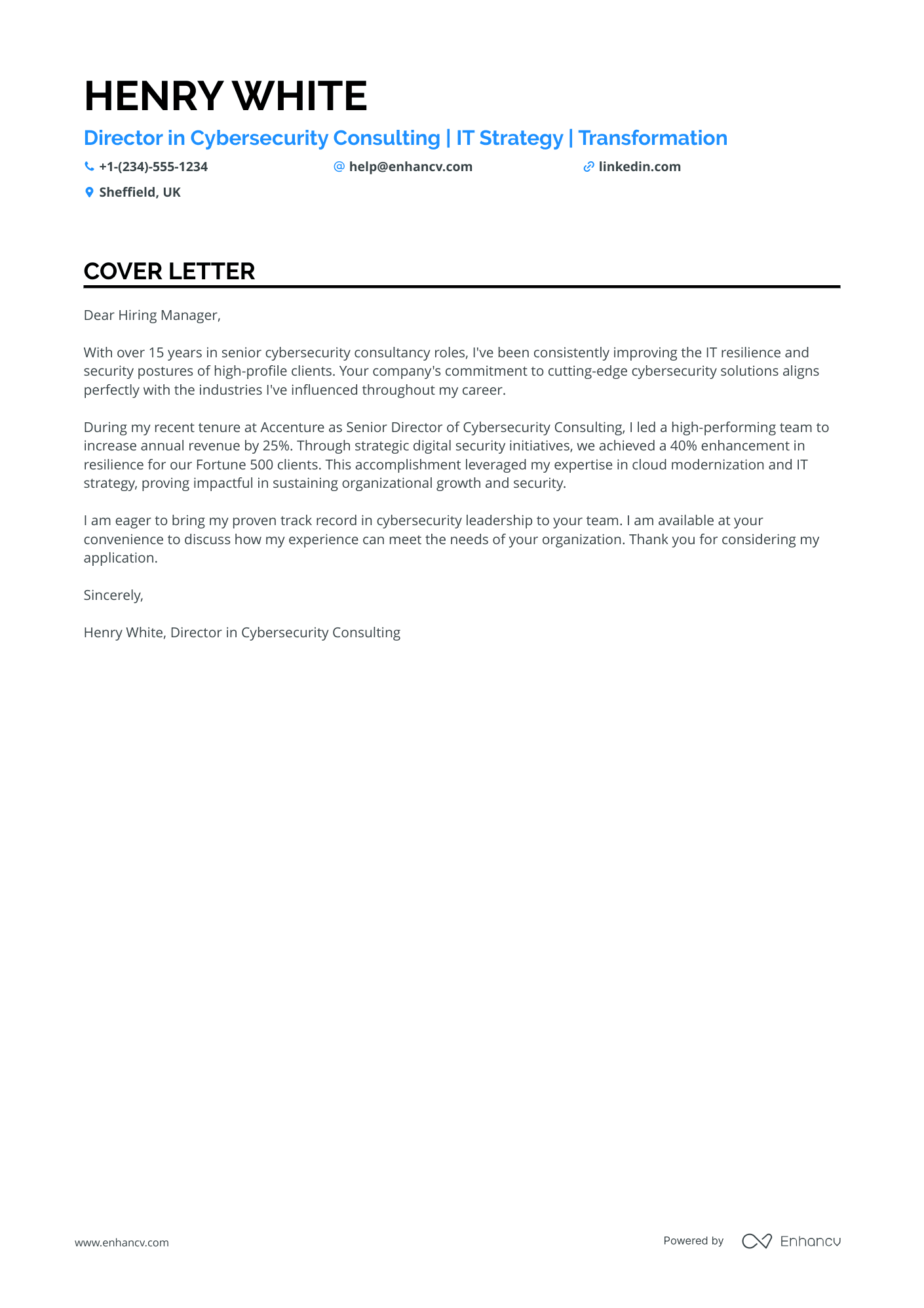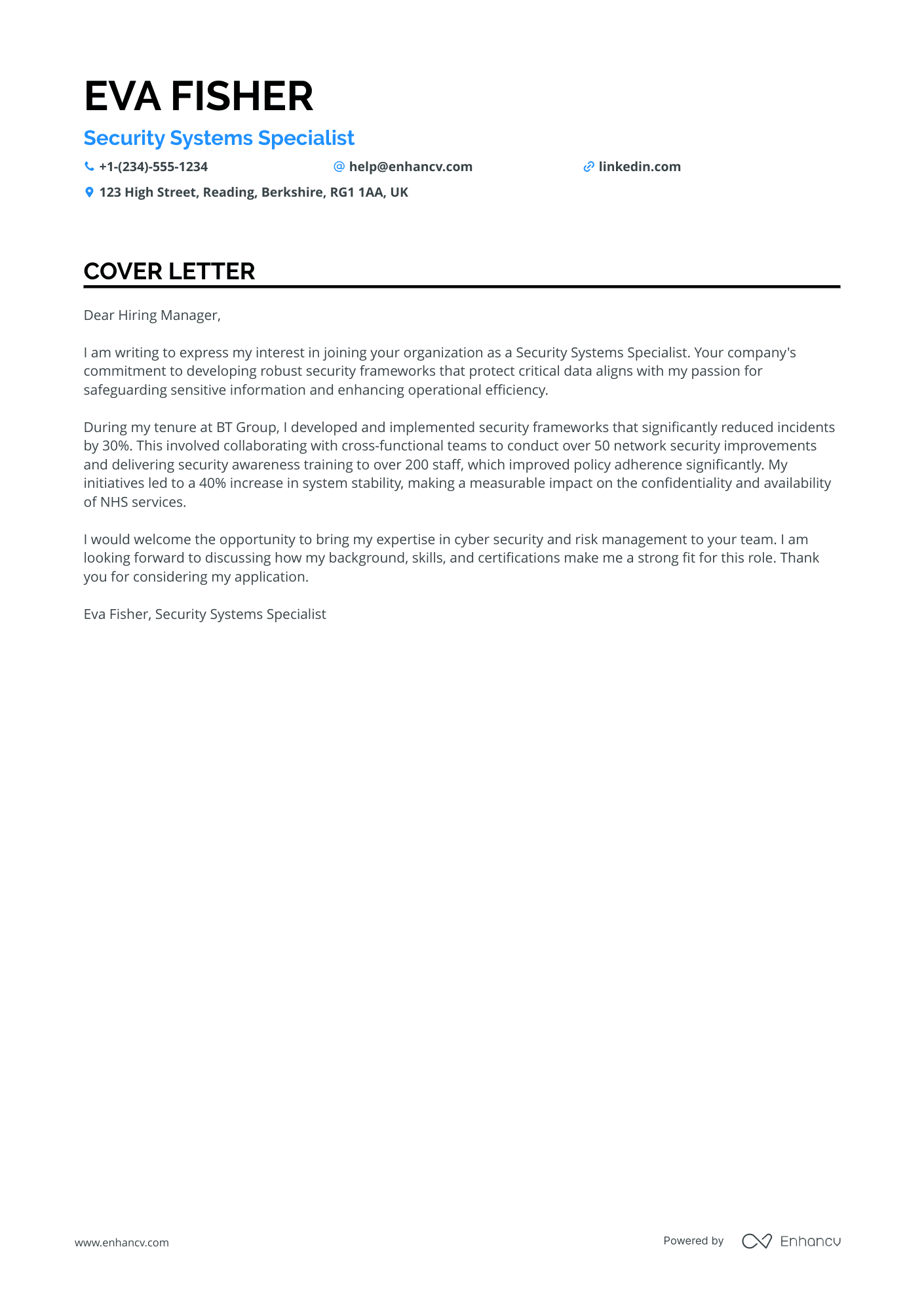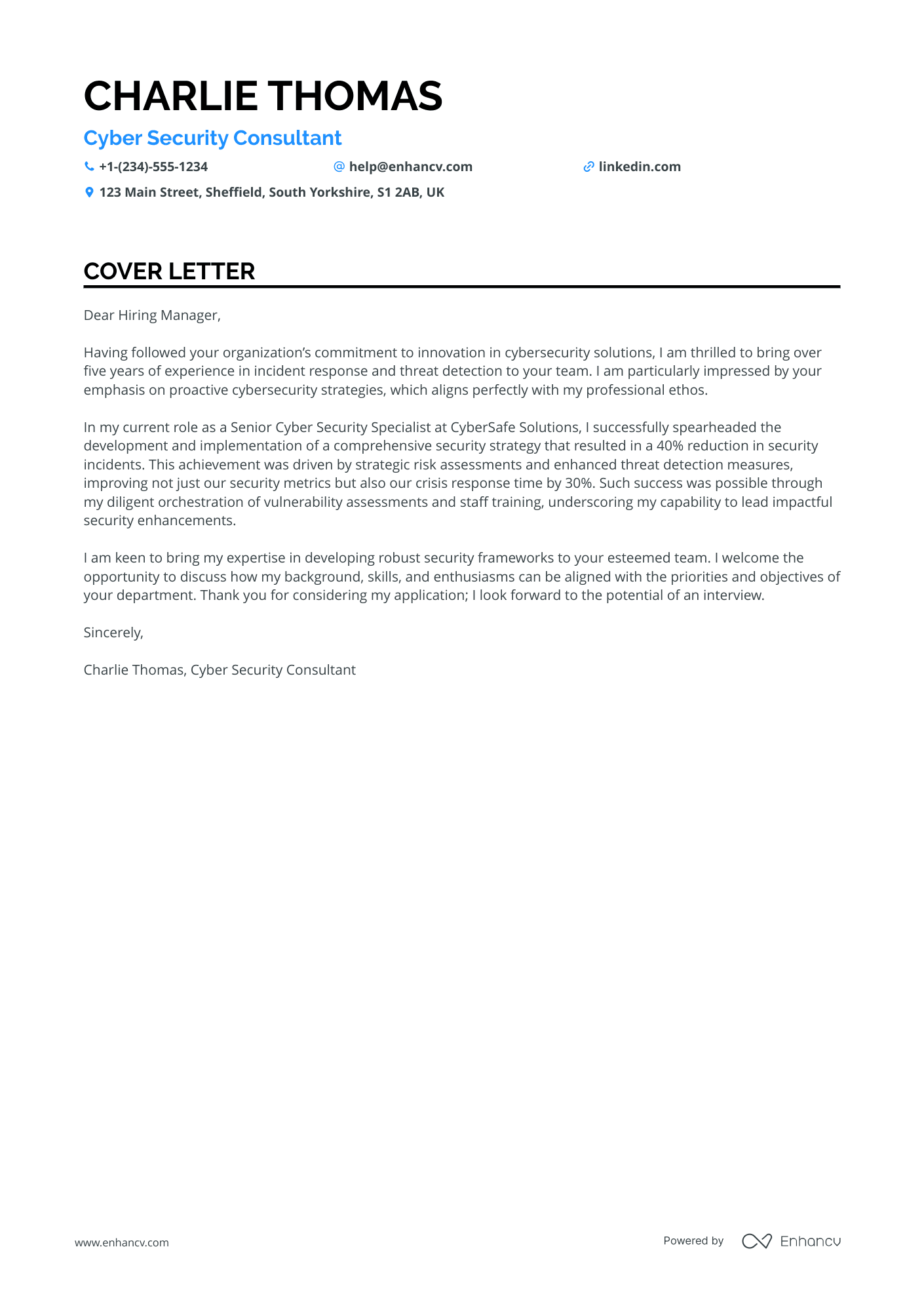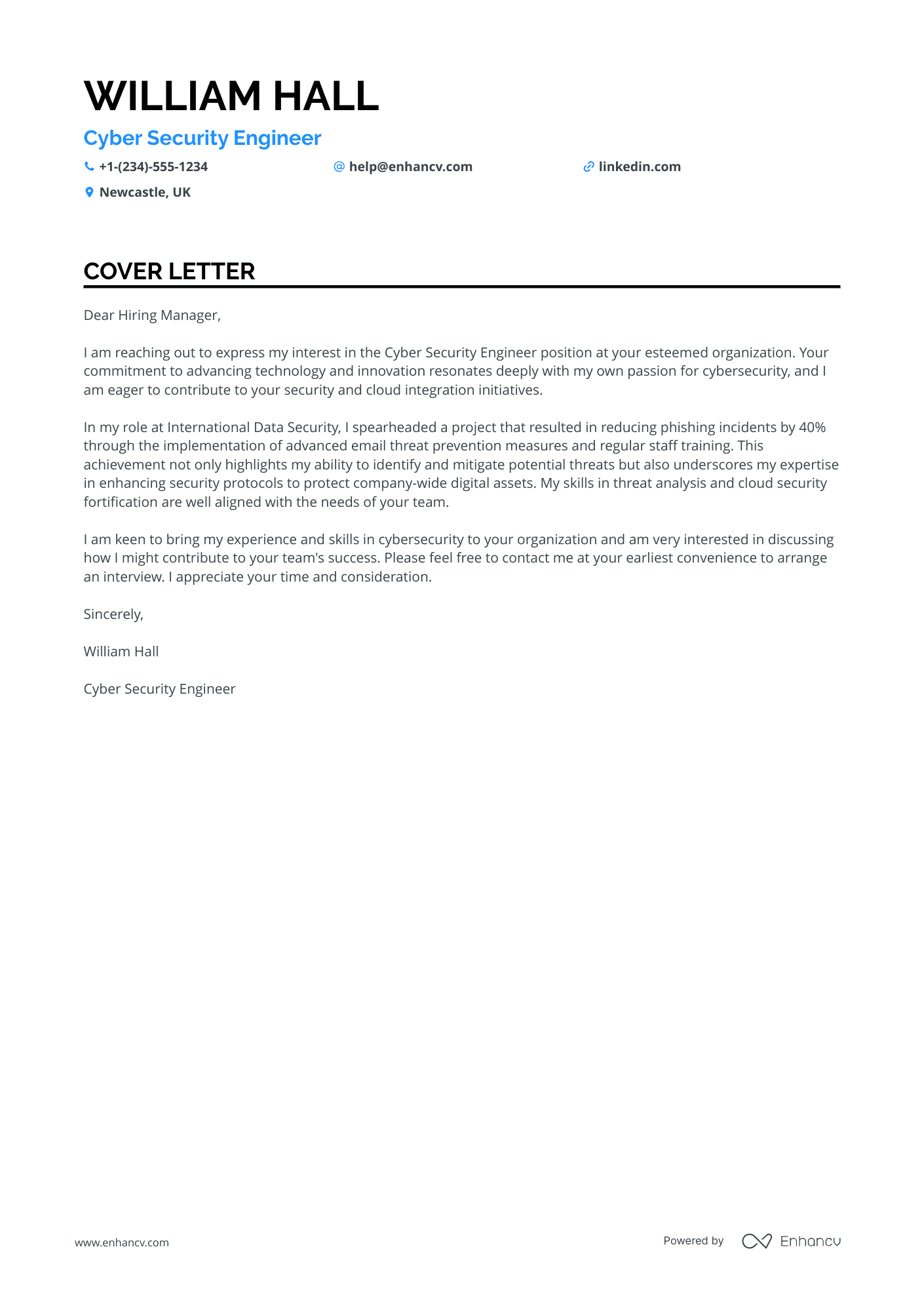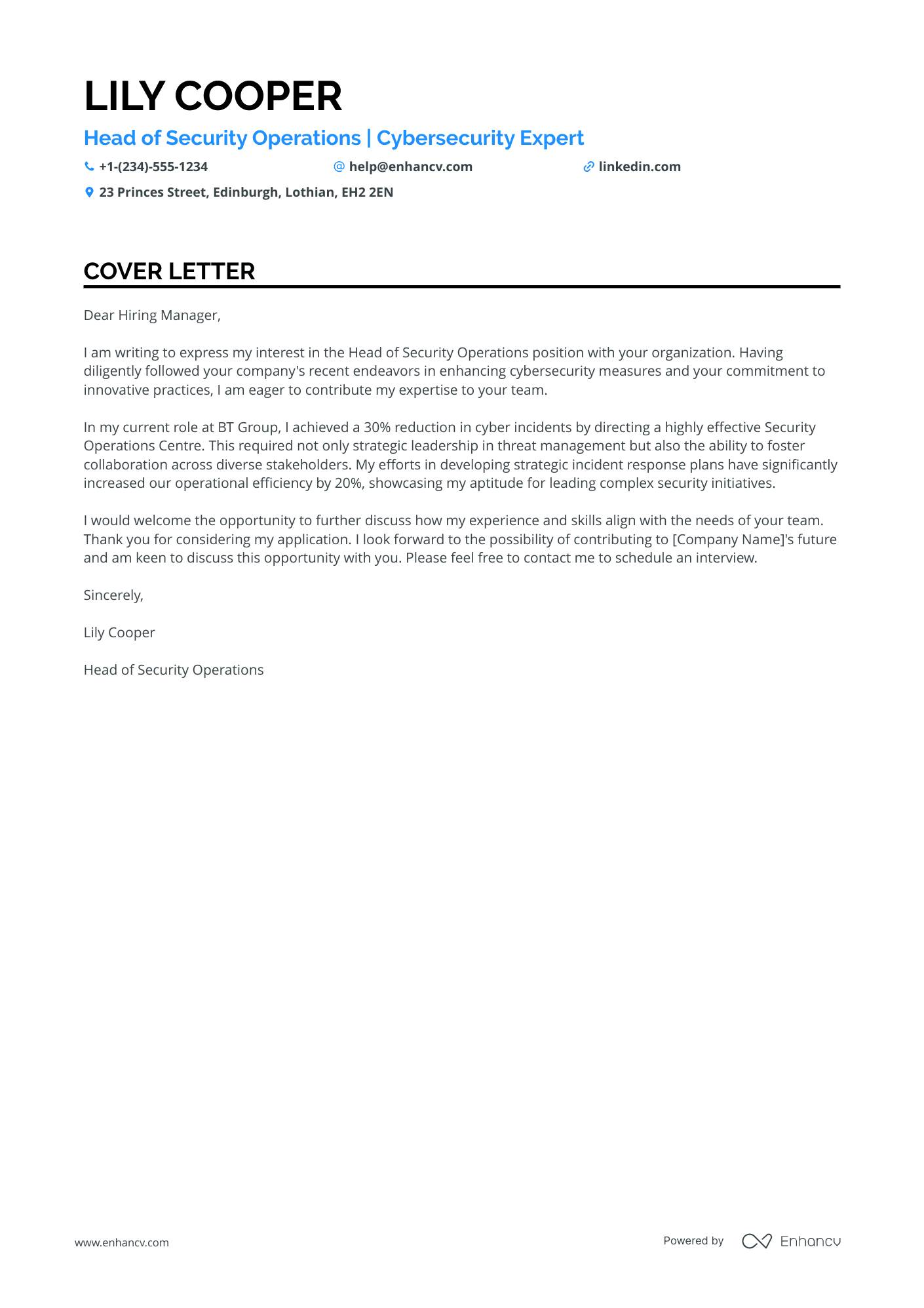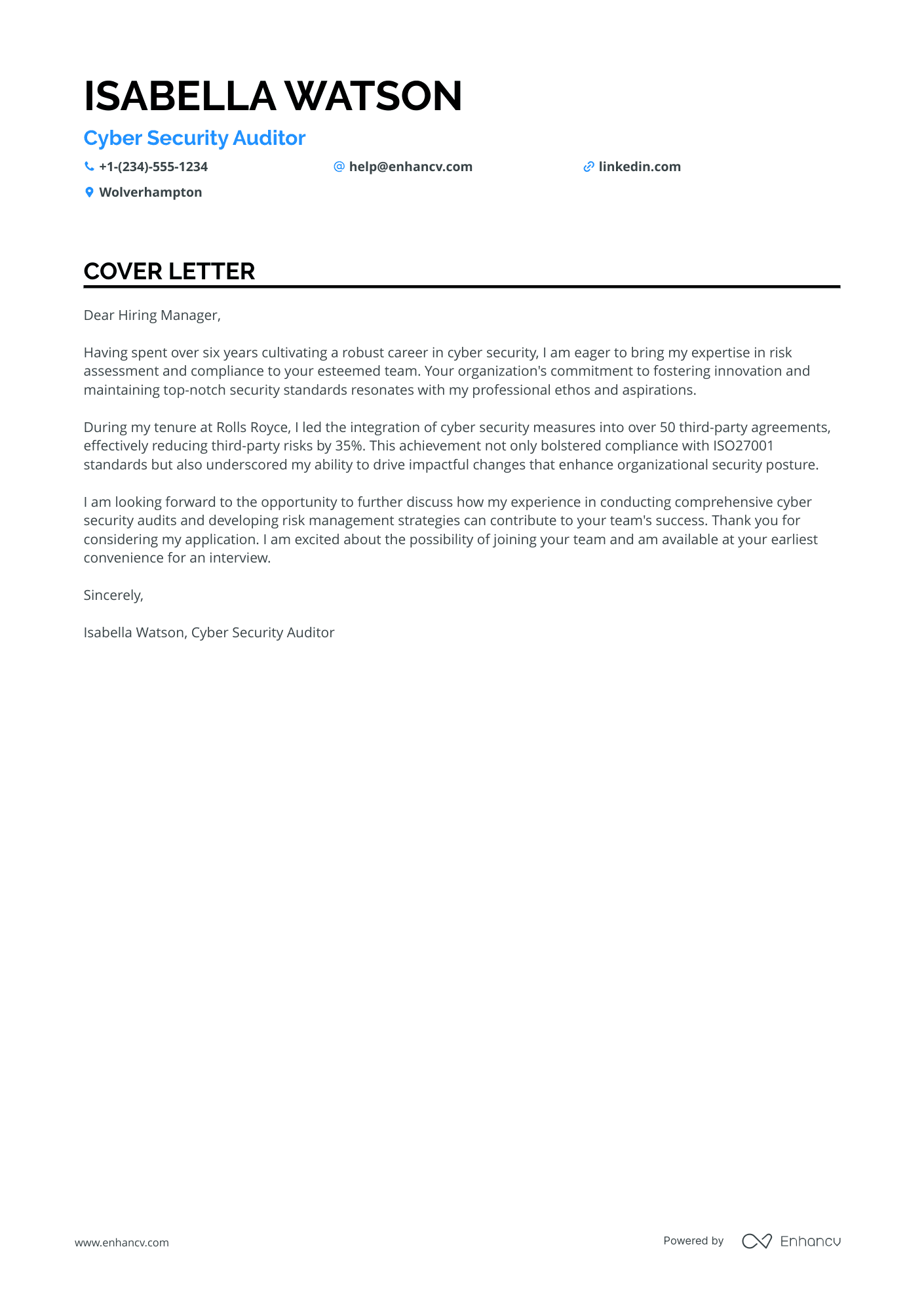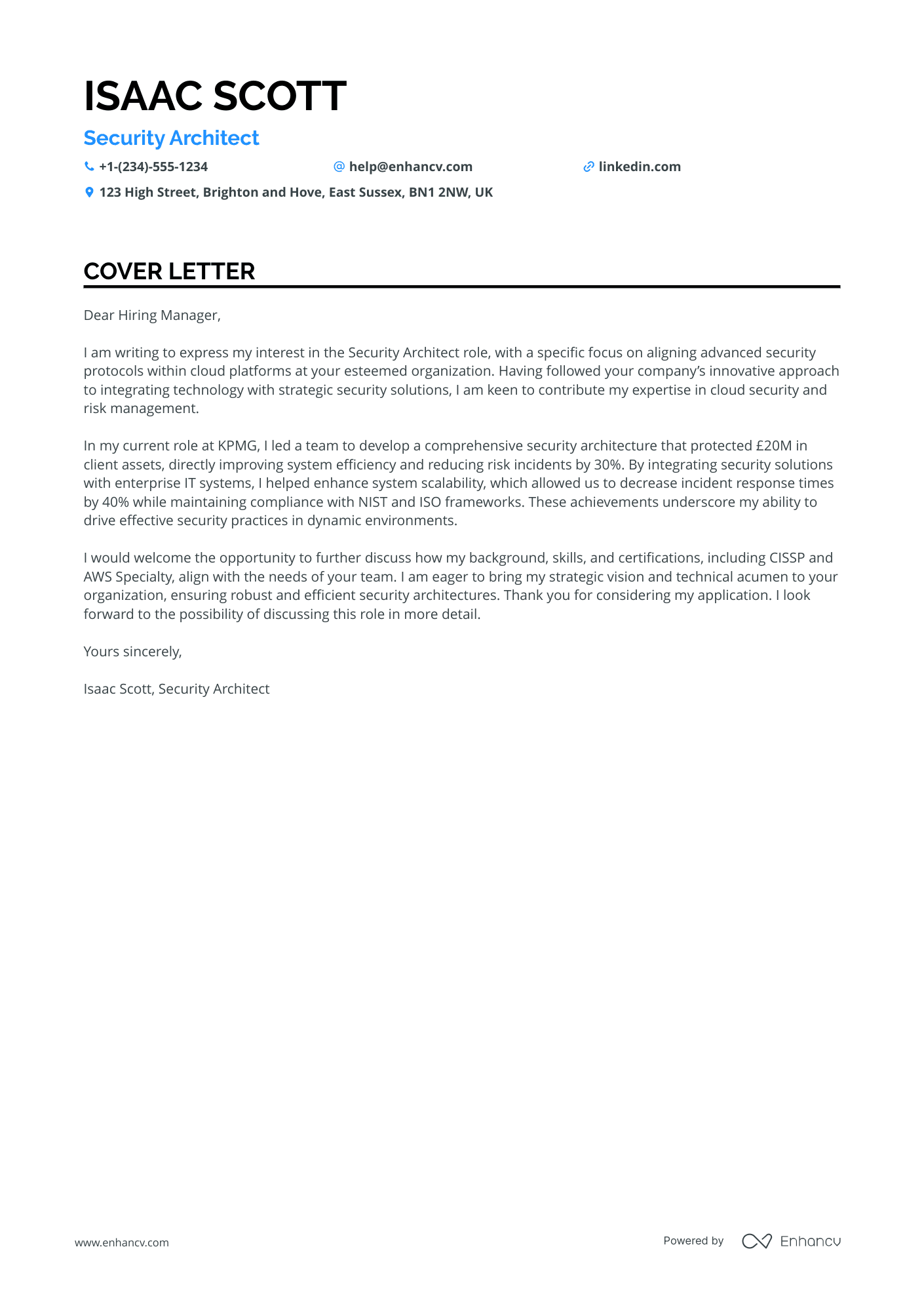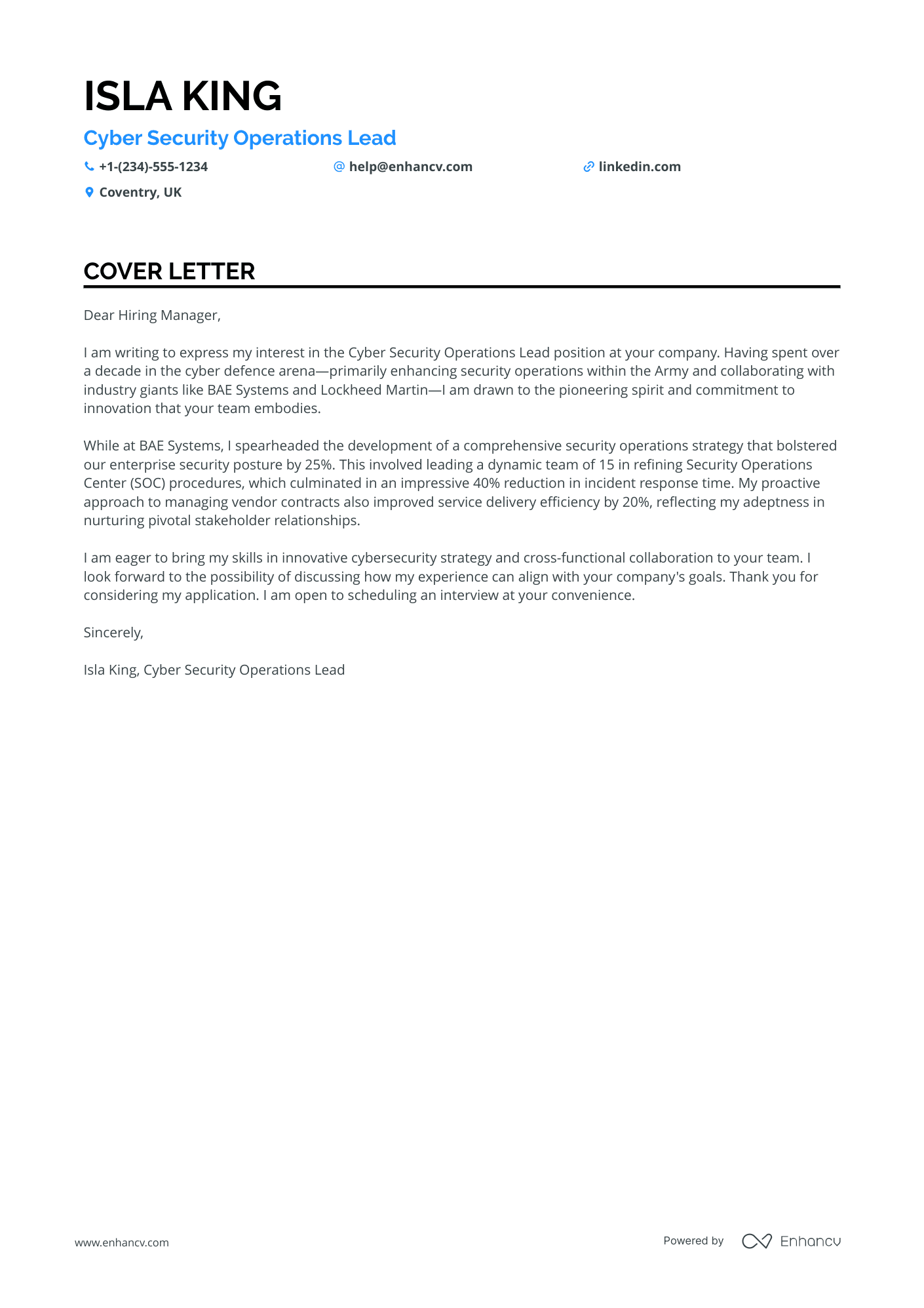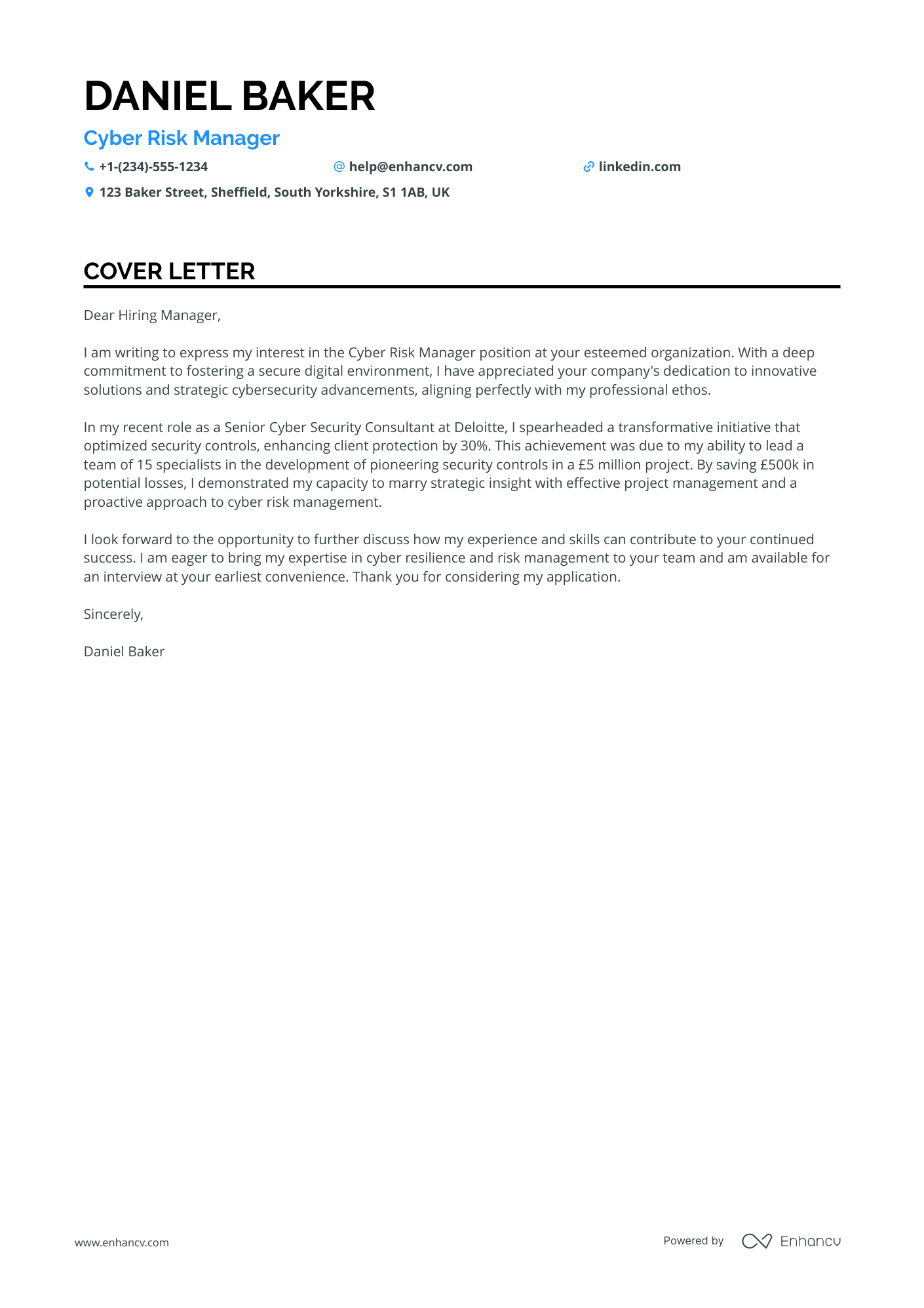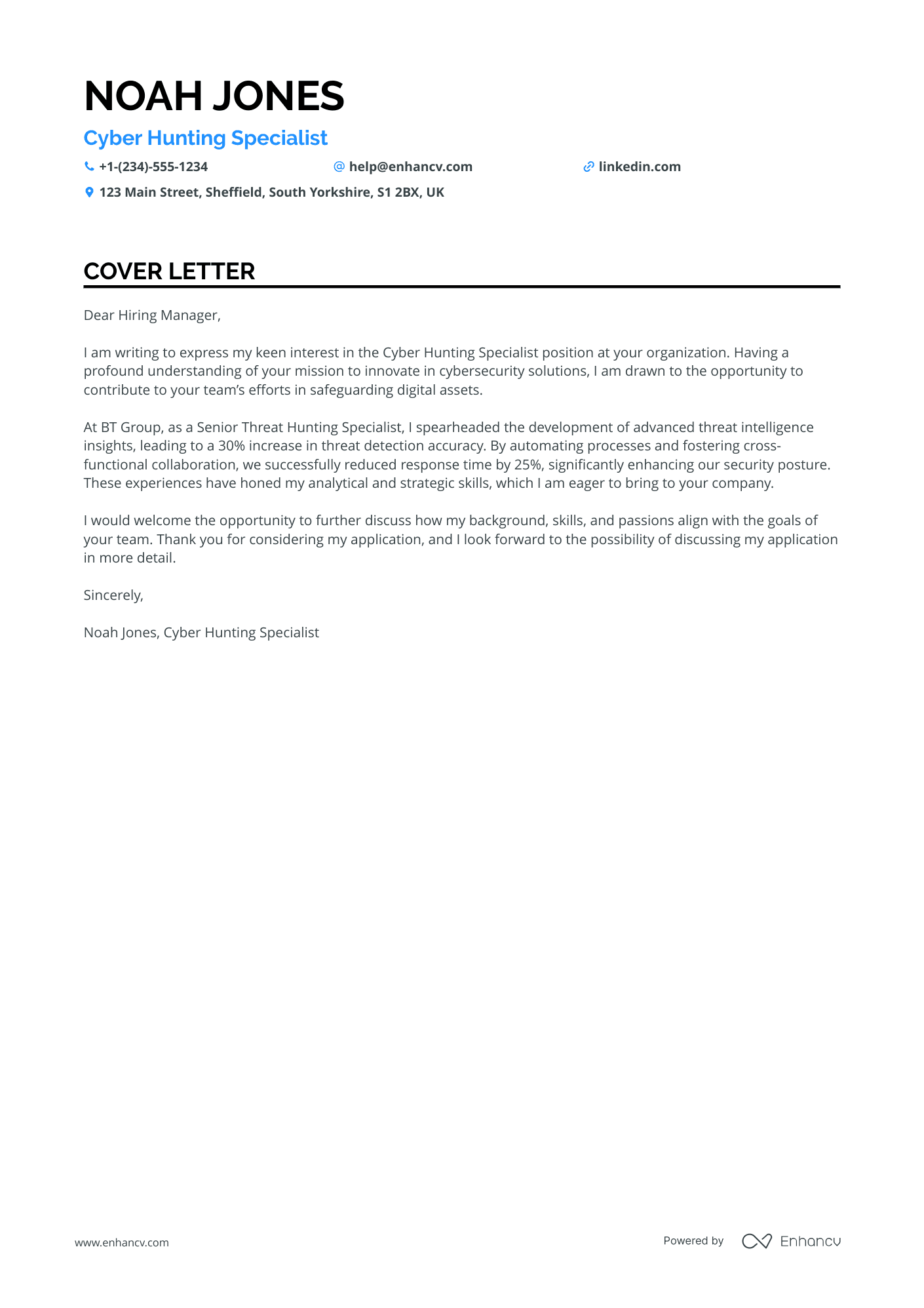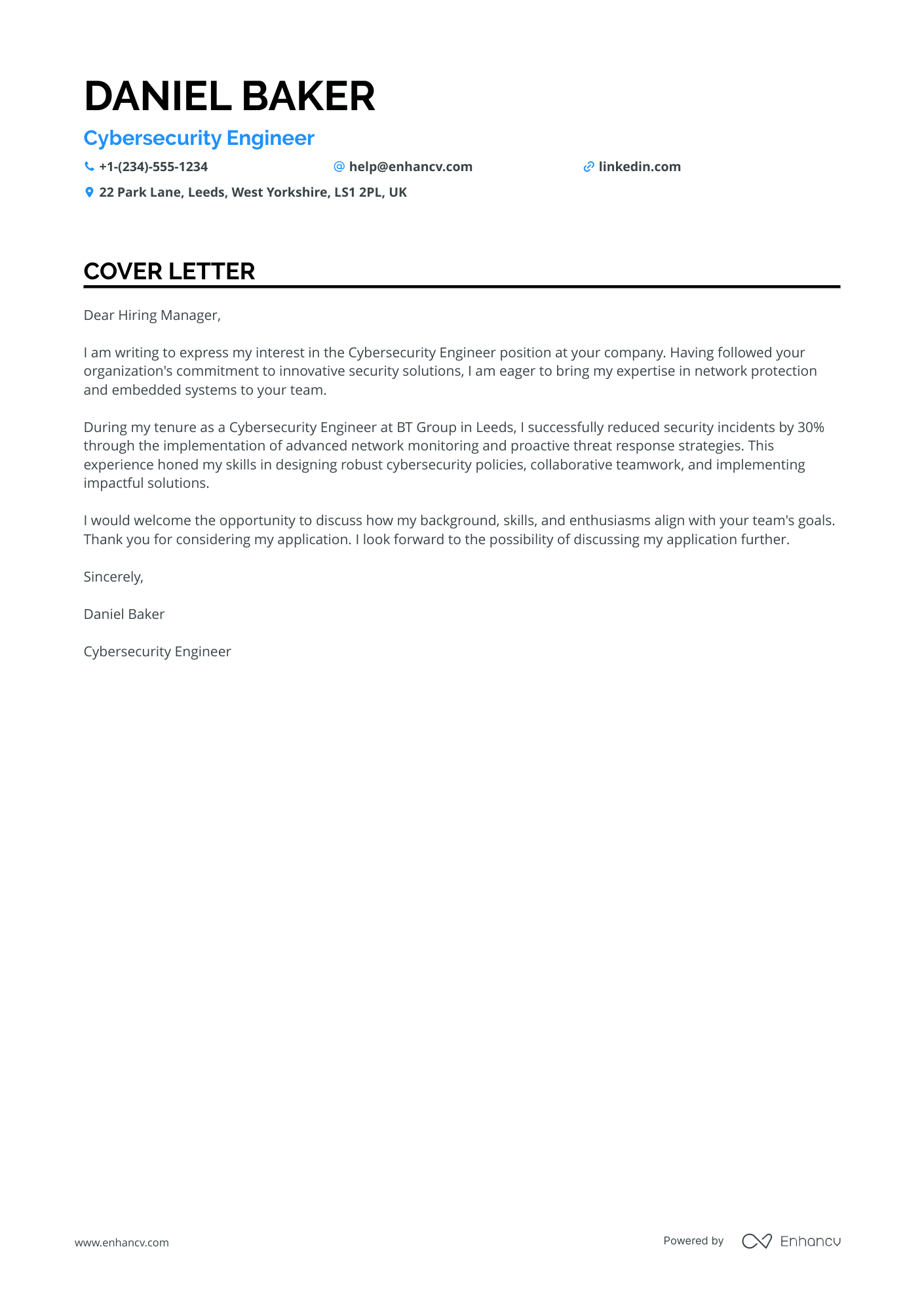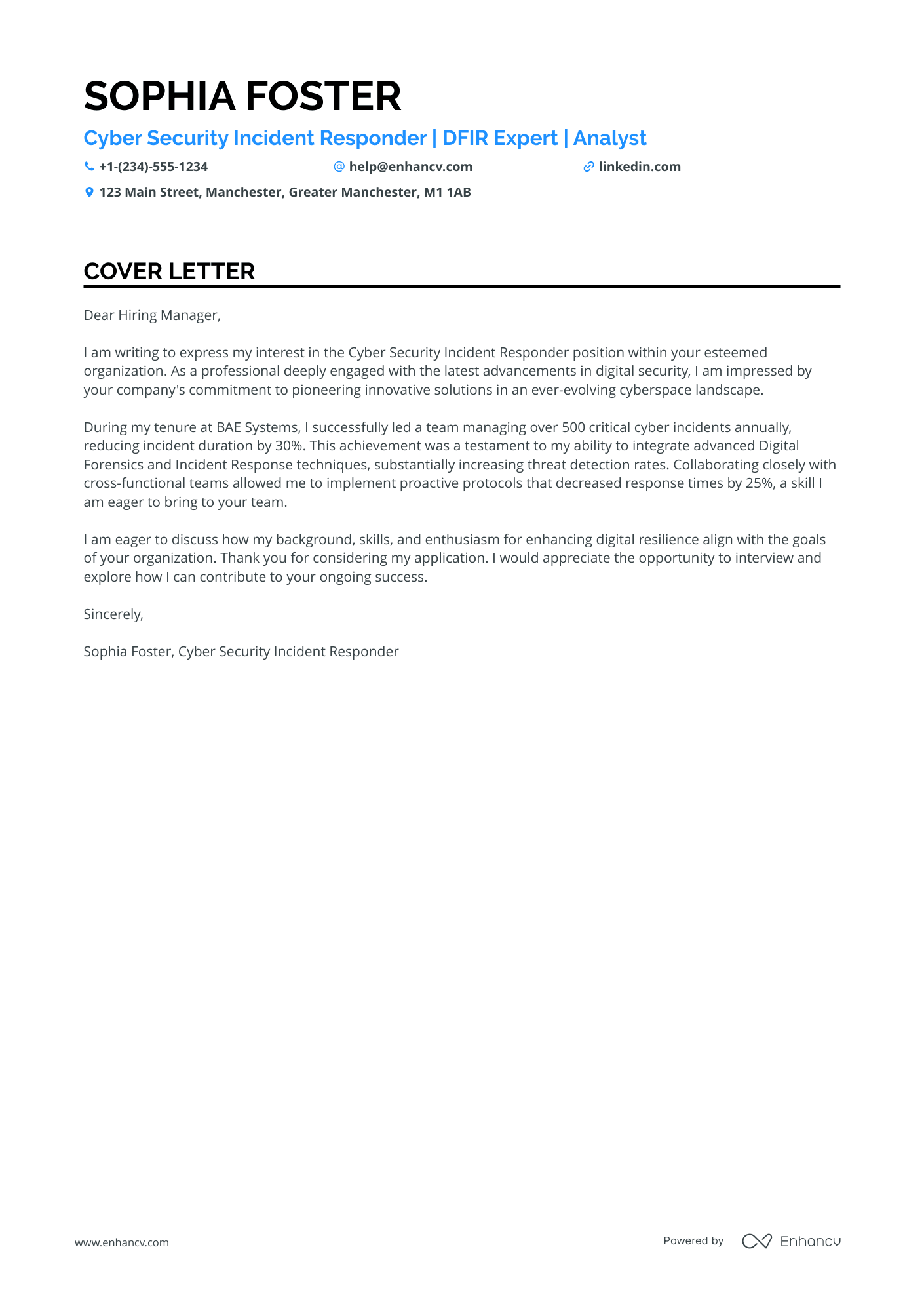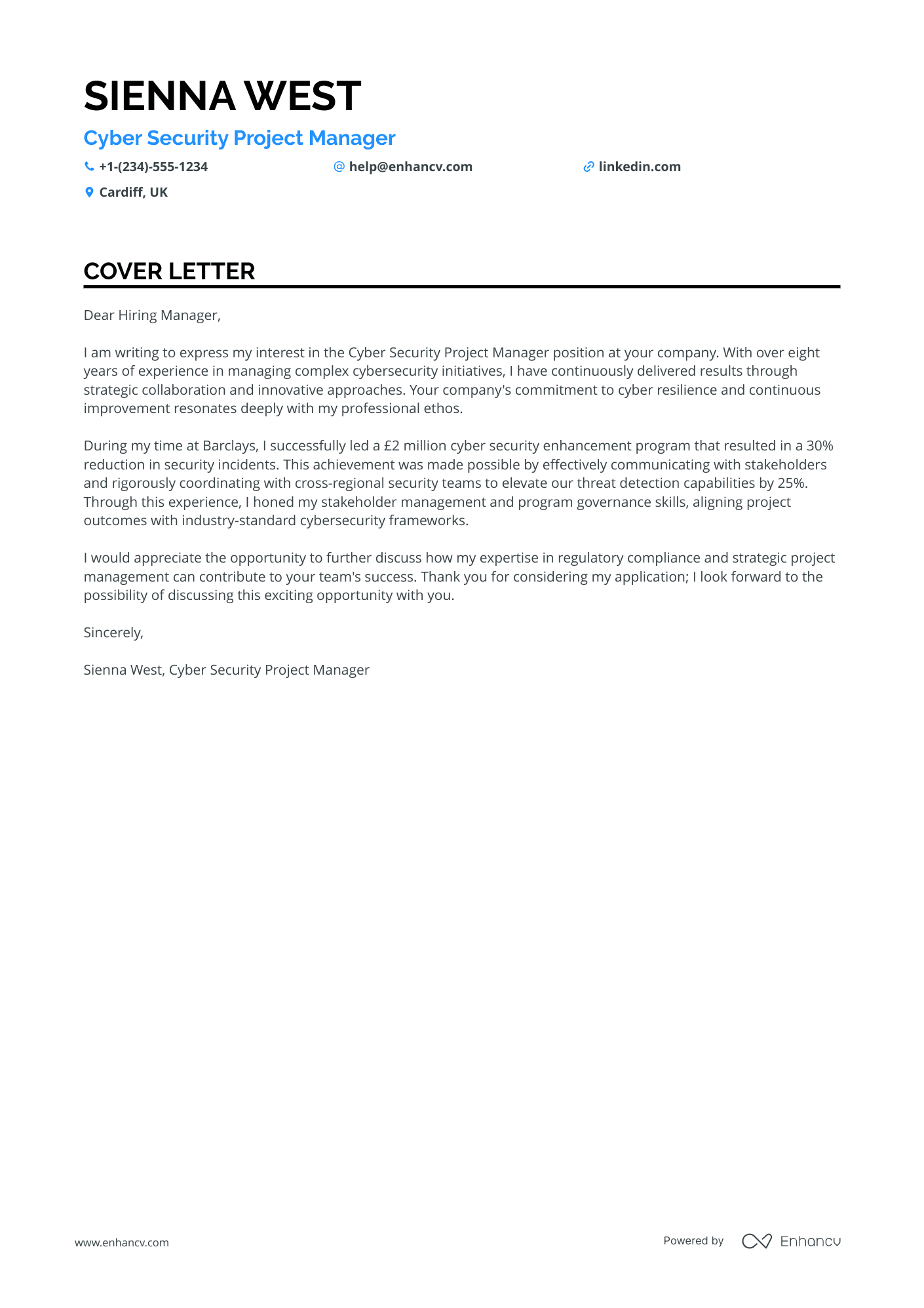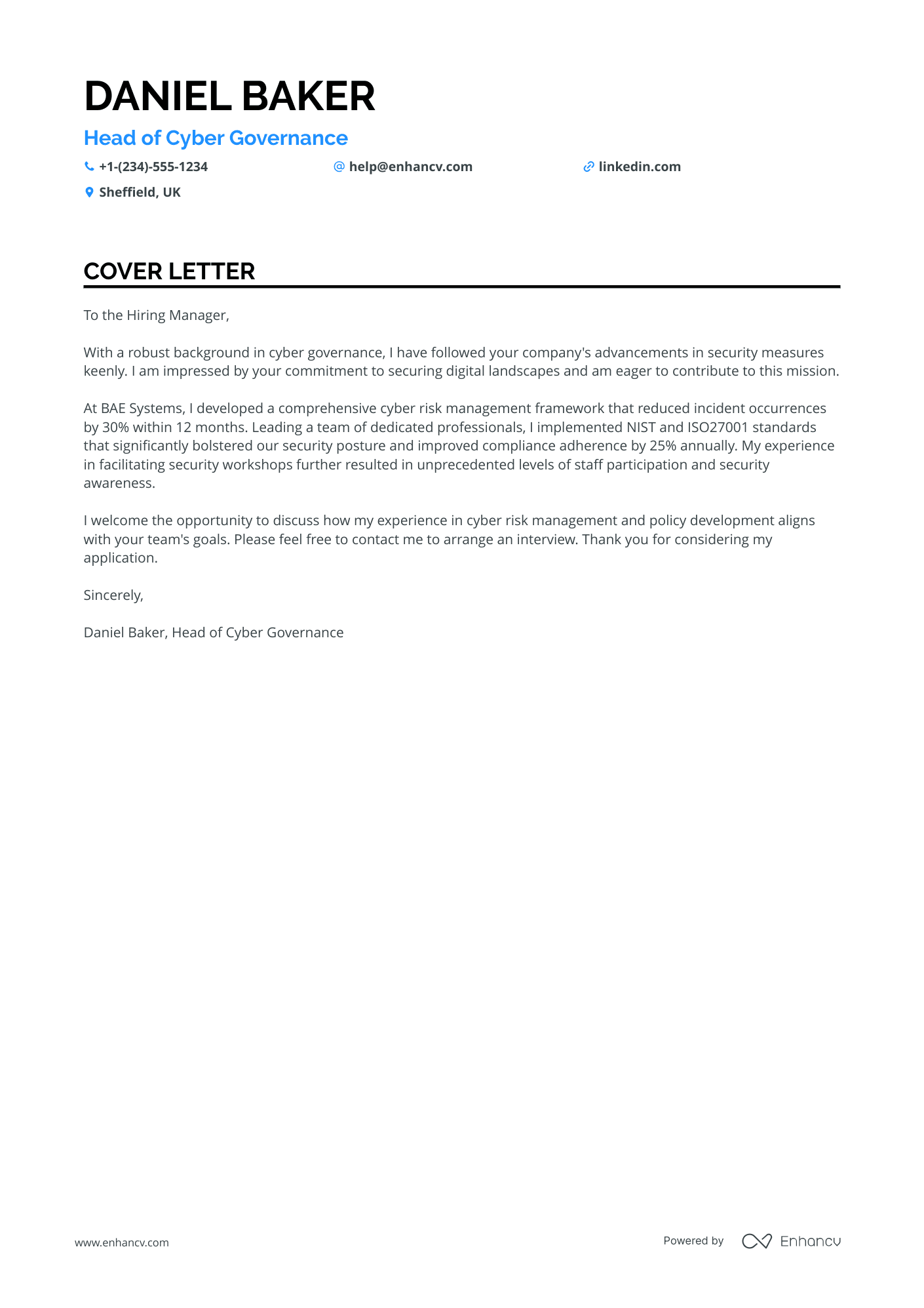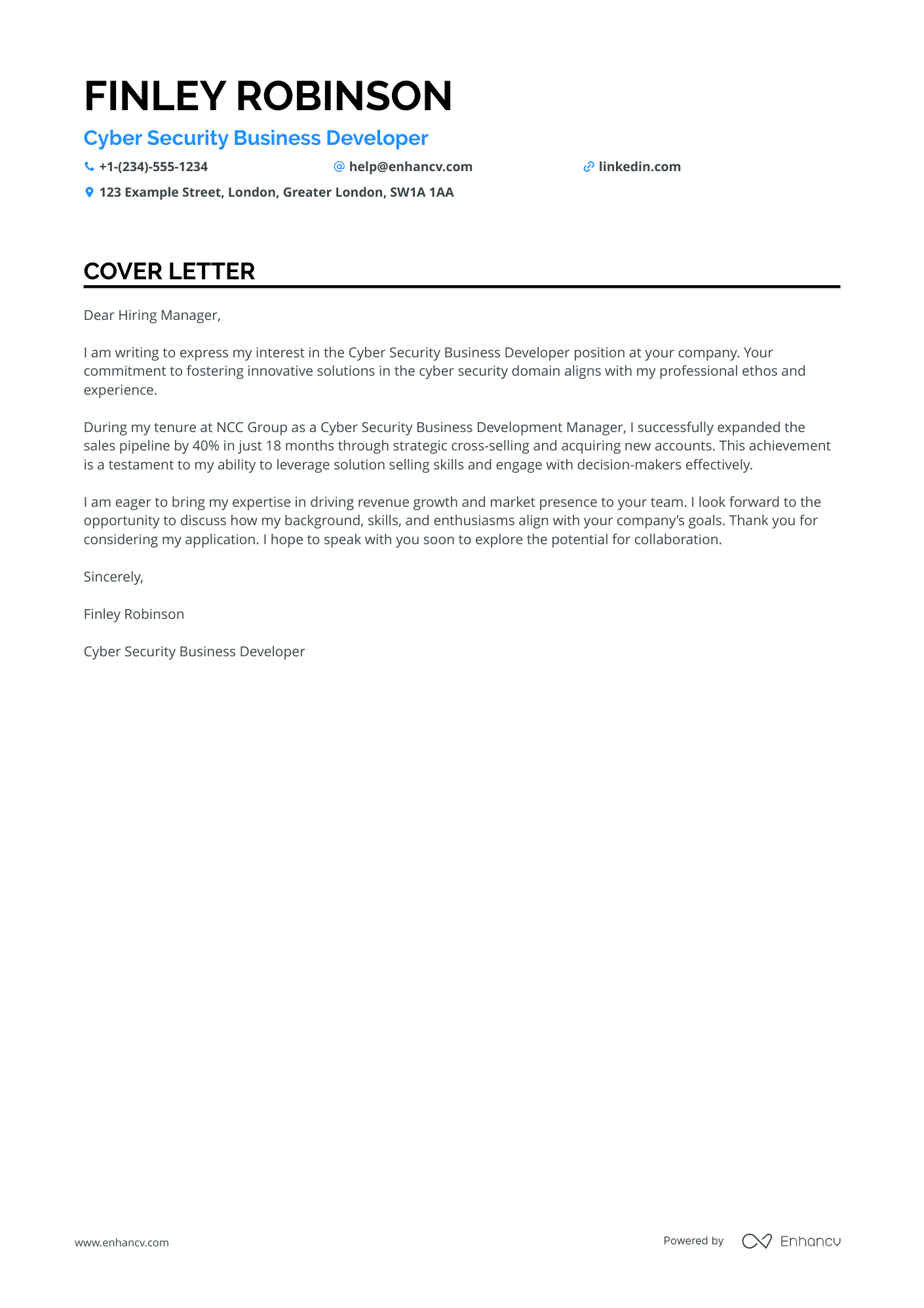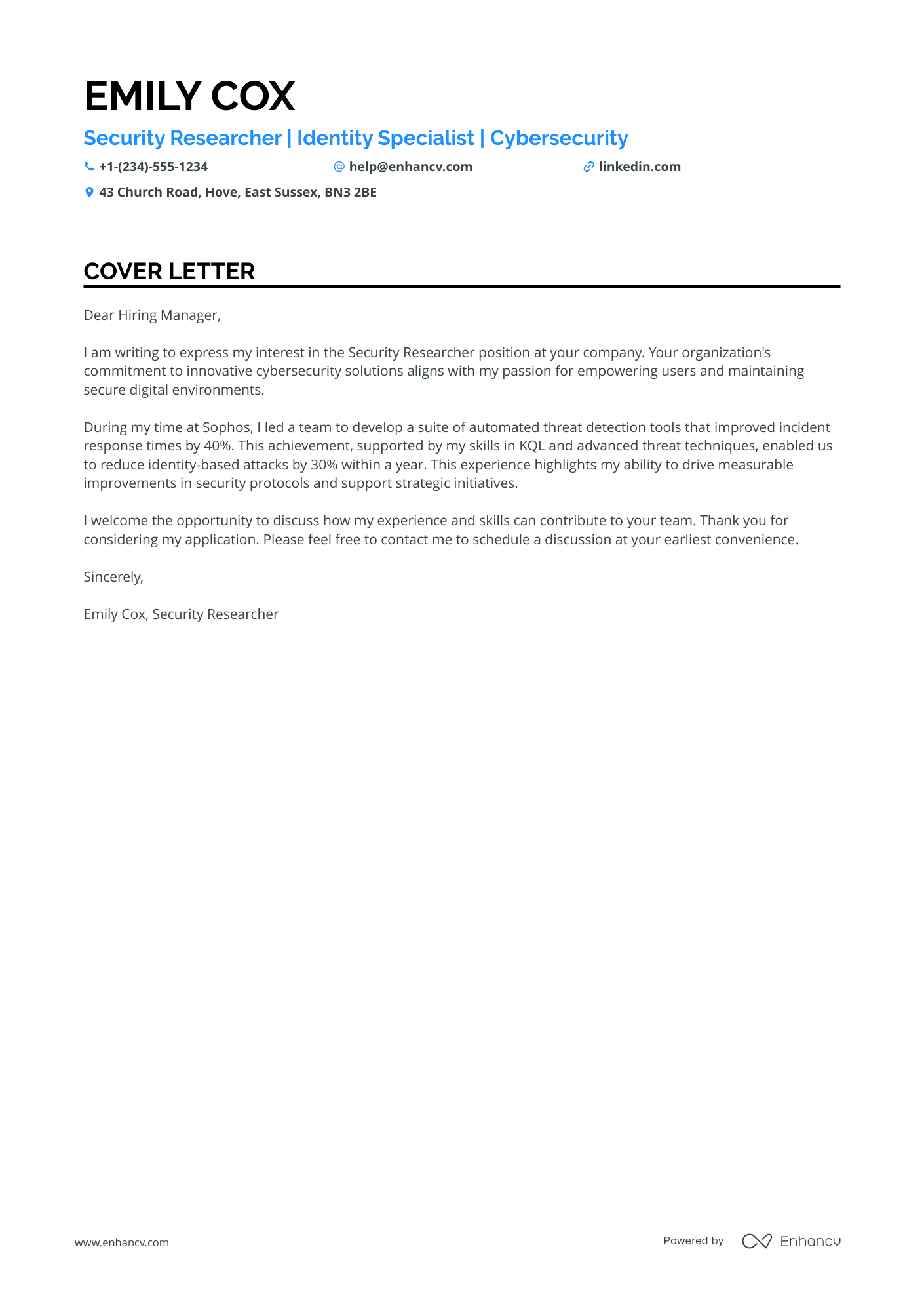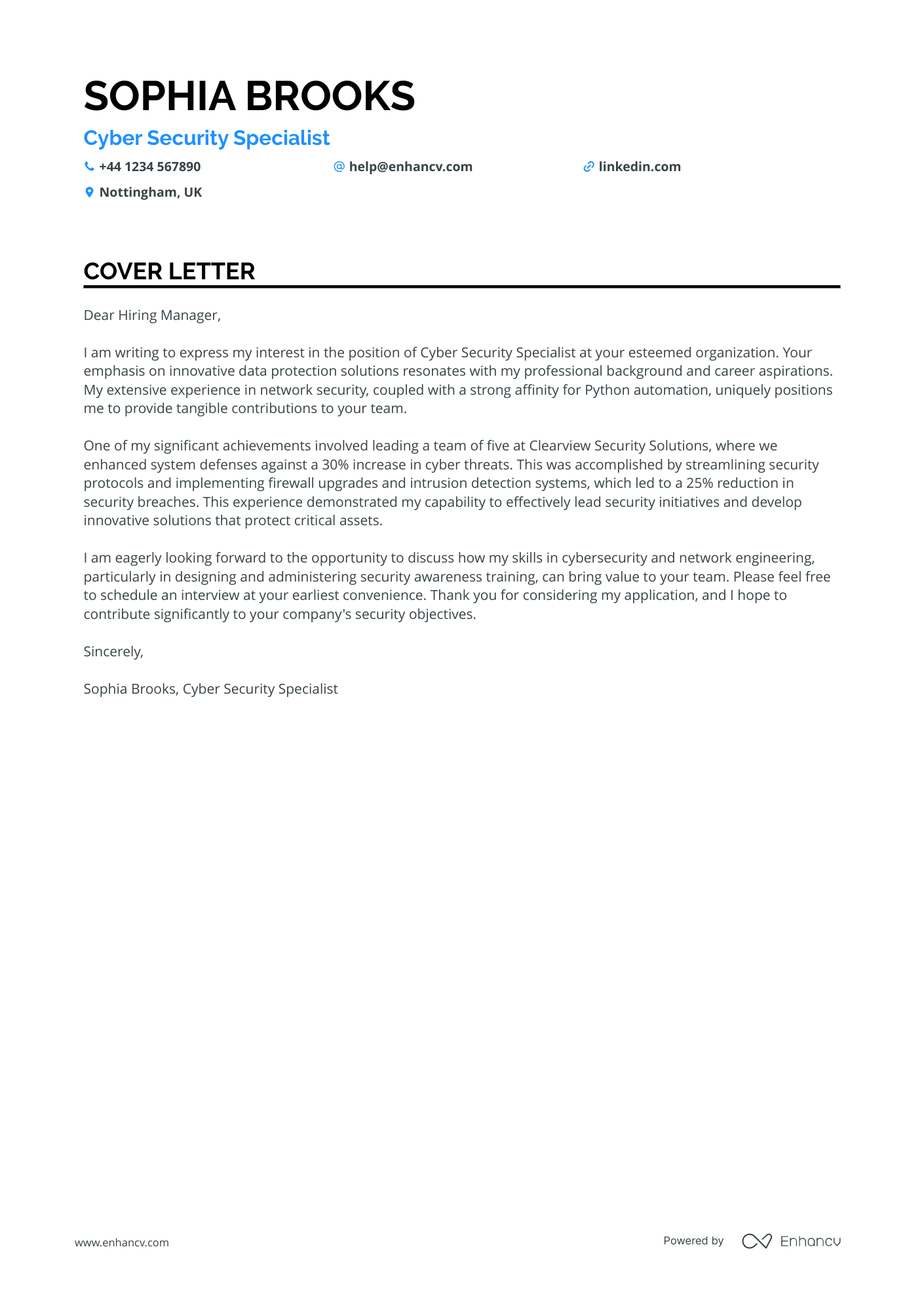You’ve just sent the same cover letter to 60 different job roles, all beginning with “Dear Sir or Madam” and ending with 'Yours sincerely.'
Bad news: you may have just missed your chance to stand out, as generic cover letters are a very common pitfall in job applications.
Did you know recruiters typically shortlist candidates based on how well they meet the job criteria? Failing to address the key requirements can cost you the role.
In this guide, we’ll show you how to tailor your cover letter to align with the job advert or company, ensuring you showcase your value as a candidate.
Cover letter examples for cyber security
By Experience
Mid-Level Cyber Security Consultant
- Certifications Highlight: The cover letter effectively highlights key certifications such as "CREST Registered Tester" and "OSCP", which are vital in demonstrating the expertise and credibility required for a Security Testing Consultant role.
- Experience Emphasis: It provides a detailed account of past experiences with specific outcomes, such as improving testing efficiency by 30% and enhancing client system resilience by 40%, which showcases tangible results and success in the field.
- Skills and Tools: The cover letter succinctly lists a variety of relevant skills and tools such as Python, C/C++, and ASM, along with specific practices like infrastructure and application testing, which align well with the requirements of cybersecurity roles.
- Passion for Industry: Expressing passion for cybersecurity research and technology innovation can resonate with employers as it shows a strong commitment to staying informed about the latest trends and continuously improving skills.
Senior Cyber Security Engineer
- Relevant Experience: Ava Phillips has over 8 years of experience in cyber security, specialising in Atlassian tools and firewall architecture – skills highly pertinent to a Senior Cyber Security Engineer role.
- Certifications: The mention of the Certified Information Systems Security Professional (CISSP) certification showcases Ava's commitment to maintaining high standards in information systems security.
- Process Efficiencies & Achievements: Highlighted where Ava has driven process improvements and efficiencies, such as a 30% increase in process efficiency, which is crucial for roles focused on security and operations excellence.
- Mentoring Ability: Experience in mentoring junior team members and facilitating knowledge transfer indicates Ava's leadership capabilities and readiness for a senior role.
Lead Cyber Security Architect
- Highlight Relevant Experience: The cover letter effectively showcases over 12 years of expertise in cybersecurity, highlighting achievements such as a 20% risk reduction and optimised security protocols at Barclays Bank, which are crucial for a Senior Lead Cybersecurity Architect role.
- Emphasise Key Skills: By incorporating skills like public cloud computing, threat modelling, and risk management, the letter aligns well with the job role, suggesting the candidate's ability to handle complex cybersecurity challenges in a banking environment.
- Showcase Impactful Achievements: Achievements like implementing secure micro-service architectures and enhancing system resilience by 35% provide concrete examples of the candidate's ability to make a significant impact, reinforcing their suitability for a lead role in cybersecurity.
- Highlight Education and Certifications: The mention of an MSc in Cybersecurity and certifications like the Certified Information Systems Security Professional validates the candidate's specialised knowledge and commitment to continuous professional development in this field.
Executive Director of Cyber Security
- Highlighting Specialised Skills: The cover letter effectively emphasises Henry's expertise in cybersecurity consulting, IT strategy, and digital transformation—key skills essential for a senior role in technology consulting.
- Demonstrating Leadership Success: Through specific examples of leading teams, such as the 25% revenue increase and high client satisfaction at Accenture, the letter showcases Henry's ability to manage and inspire teams effectively.
- Mentioning Relevant Certifications: The inclusion of certifications, like the Cybersecurity Risk Management Certification from Harvard University, underscores Henry's commitment to continuous professional development and expertise in crucial areas of cybersecurity.
- Articulating Impactful Achievements: The letter presents concrete achievements such as developing a security framework that significantly reduced vulnerabilities and enhanced compliance, which is crucial for assuring potential employers of his capability to deliver results.
By Role
Cyber Security Analyst
- Relevant Certifications: Highlighting the Certified Information Systems Security Professional (CISSP) certification underscores specialised expertise in managing IT security systems, which is pivotal for a role focused on cyber security.
- Quantifiable Achievements: Mention of concrete improvements, such as reducing incidents by 30% and boosting system stability by 40%, provides tangible evidence of capability in enhancing cyber defence strategies, which is highly valuable to potential employers.
- Experience in Key Industries: Direct involvement in overhauling security for key services such as the NHS emphasizes sector-specific experience that can be critical in roles requiring specialised industry knowledge.
- Education and Skill Development: By mentioning advanced education such as an MSc in Cyber Security, alongside pursuing further growth opportunities like expertise in cryptographic services, the letter showcases a commitment to continuous learning and skill enhancement.
Cyber Security Consultant
- Highlighting key achievements and specific metrics, such as reducing security incidents by 40%, demonstrates tangible results and effectiveness in the role.
- Emphasising specialised skills, such as incident response and network defence, showcases expertise relevant to the Cyber Security Consultant position.
- Including a relevant certification, such as Certified Information Systems Security Professional (CISSP), indicates advanced knowledge and commitment to professional development in cyber security.
- Showcasing soft skills like clear communication and attention to detail alongside technical capabilities provides a well-rounded profile suited for consulting roles.
Cyber Security Engineer
- Targeted Certifications: Highlighting specific certifications like the Azure Security Engineer Associate Certification and CISSP provides credibility and demonstrates a specialised skill set important for a cybersecurity role.
- Metrics-Driven Achievements: Clearly stating quantifiable results, such as reducing phishing incidents by 40% and improving SIEM efficiency by 35%, offers concrete evidence of the candidate's impact and effectiveness in previous roles.
- Relevant Technical Skills: Emphasising key technical skills such as Cloud Security, Email Threat Prevention, and Data Loss Prevention underscores the candidate's expertise in crucial areas relevant to potential employers.
- Collaboration and Integration: Mentioning collaborative efforts with global teams and cross-functional departments demonstrates the candidate's ability to work in diverse teams, a valuable trait in cybersecurity roles that require integration of various security measures.
Head of Cyber Security
- Highlighting Certifications: The cover letter effectively mentions the Certified Information Systems Security Professional (CISSP) certification, which is crucial for validating expertise in cybersecurity management and leadership roles.
- Emphasising Key Skills: It lists pertinent skills such as threat analysis, incident response, and network monitoring, which are specifically relevant to cybersecurity and security operations positions.
- Demonstrating Achievements: The letter successfully outlines significant achievements such as reducing SOC reaction time by 40% and increasing threat detection accuracy by 35%, showcasing the candidate's impact and effectiveness in previous roles.
- Experience with Stakeholders: It highlights the ability to build trusted relationships with stakeholders and collaborate across diverse teams, emphasising essential soft skills for leadership roles in security operations.
Cyber Security Auditor
- Emphasising Certifications: The cover letter highlights certifications such as Certified Information Security Manager (CISM) and ISO/IEC 27001 Lead Auditor, which are critical for a Cyber Security Auditor role, showing specialised expertise and dedication to the field.
- Quantifying Achievements: Noting tangible achievements like improving risk management procedures by 30% and reducing audit times by 40% effectively demonstrates the candidate's impact in previous roles and their potential value as an employee.
- Illustrating Experience with Specific Standards: Mentioning experience with standards such as ISO27001 and GDPR underscores a profound understanding of industry compliance requirements, a key aspect of cyber security auditing.
- Demonstrating Leadership in Incident Response: Citing experience in leading incident response teams and managing high-stakes situations portrays the candidate's capability to handle critical issues, essential for maintaining security integrity.
Cyber Security Architect
- Highlighting specific achievements such as securing £20M in client assets at KPMG and maintaining zero data breaches for three consecutive years to demonstrate tangible success and a track record of security excellence.
- Emphasising relevant certifications like the Certified Information Systems Security Professional (CISSP) and AWS Certified Security Specialty to showcase specialised knowledge and commitment to professional development in the cybersecurity domain.
- Showcasing a blend of technical skills and strategic abilities, such as developing and integrating security solutions, conducting thorough threat modelling, and delivering cybersecurity strategy proposals, reinforcing both technical and leadership competencies.
- Aligning the cover letter content with the latest frameworks like NIST and ISO, and mentioning compliance success to assure potential employers of up-to-date expertise and adherence to industry standards.
Cyber Security Operations Manager
- Highlight Relevant Experience: Emphasise roles that directly align with the responsibilities of a Cyber Security Operations Lead, such as previous positions like Cyber Security Operations Manager and Senior Cyber Security Analyst, showcasing achievements in incident response and security strategy implementation.
- Key Certifications: Mention critical certifications like CISSP and CISM, which validate expertise in managing security practices and leading information security programmes, strengthening credibility in the field.
- Quantifiable Achievements: Incorporate measurable outcomes, such as improving enterprise security posture by 25% or reducing recovery times by over 30%, to effectively demonstrate impact and value to potential employers.
- Demonstrate Leadership Skills: Stress leadership qualities and experience in managing teams and cross-functional collaborations, such as leading a multi-disciplinary team or overseeing training programmes to elevate team qualifications and capabilities.
Cyber Security Risk Manager
- Specific Expertise: The cover letter highlights over 10 years of experience in cyber security with a focus on managing complex risk management strategies, a crucial skill set for a Cyber Risk Manager.
- Certification Relevance: Points out the Certified Information Systems Security Professional (CISSP) certification, which is directly relevant to IT security risk management and regarded highly in the industry.
- Quantifiable Achievements: Provides specific statistics, such as improving client threat response by 40% and enhancing organisational compliance by 50%, showcasing the tangible impact of previous roles.
- Leadership and Project Management: Emphasises leadership experience in managing large teams and handling high-value projects, demonstrating the capacity to lead initiatives and influence organisational cyber resilience.
Cyber Security Forensic Expert
- Relevant Experience: The cover letter effectively highlights the candidate's experience in senior threat hunting roles, showcasing specific achievements like increasing threat detection accuracy by 30% and reducing response times.
- Quantifiable Achievements: Emphasising achievements with quantifiable metrics, such as a 25% decrease in threat detection response time, provides concrete evidence of the candidate's impact in their previous roles.
- Specialised Skills and Tools: Mentioning skills specific to cybersecurity, such as threat intelligence, malware analysis, and familiarity with platforms like Splunk, demonstrates expertise suited for the cyber hunting specialist role.
- Certifications and Courses: Listing relevant certifications, such as a course on Malware Analysis & Reverse Engineering from the SANS Institute, underscores the candidate's commitment to ongoing professional development.
Cyber Security Software Developer
- Highlight Quantifiable Achievements: The cover letter effectively showcases Daniel's accomplishments with quantifiable data, such as a 30% reduction in security incidents, that provides tangible evidence of his impact and skills in cybersecurity.
- Emphasise Relevant Experience: The letter highlights Daniel's experience in key areas like network protection and embedded systems, directly aligning with the requirements of a Cybersecurity Engineer role, ensuring relevancy and demonstrating expertise.
- Incorporate Specific Skills and Tools: Mentioning specific skills like programming, React, and real-time systems, as well as knowledge in security protocols, amplifies Daniel's technical proficiency and suitability for engineering roles.
- Use of Industry Certifications and Training: Daniel underscores his commitment to professional development by listing relevant courses such as advanced cyber threat detection, augmenting his credibility and showing continuous learning.
Cyber Security Incident Responder
- Highlighting Certifications: Mentioning relevant certifications such as the GIAC Certified Incident Handler (GCIH) demonstrates specialised knowledge and expertise in security incidents, aligning perfectly with the cyber security role.
- Showcasing Quantifiable Achievements: Providing data-driven achievements, like reducing incident costs by $1M and enhancing detection by 40%, adds credibility and illustrates the candidate’s capability in delivering impactful results.
- Emphasising Leadership Experience: Describing leadership roles, such as leading cross-functional teams or initiatives, highlights the candidate's ability to drive projects and manage people effectively, which is crucial for senior cyber security positions.
- Stressing Technical Skills: Listing key technical skills like Digital Forensics, Incident Response, and SIEM Tools is crucial to highlight the candidate’s technical proficiency required for a Cyber Security Incident Responder.
Cyber Security Project Manager
- Highlight relevant certifications such as CISSP and PMP to showcase expertise in advanced cybersecurity management and strategic project execution.
- Emphasise achievements in delivering large-scale cybersecurity initiatives, such as the £2 million cyber security enhancement programme, demonstrating management skills and successful project outcomes.
- Include specific metrics and results, like the 30% reduction in security incidents, to quantify success in previous roles and illustrate impact.
- Showcase strong stakeholder management and regulatory compliance skills to align with the role's requirements for maintaining cyber resilience and governance.
Cyber Security Compliance Officer
- Highlighting Expertise in Industry Standards: The cover letter effectively highlights expertise in implementing NIST and ISO27001 standards. For roles focused on cyber governance and compliance, showcasing familiarity with recognised frameworks is crucial.
- Proven Leadership and Management Skills: By showcasing experience leading teams and acting as an interim CISO, the applicant demonstrates strong leadership qualities that are important for executive roles in cybersecurity.
- Quantifiable Achievements: The use of specific metrics, such as reducing incident occurrence by 30% or improving compliance adherence by 25%, provides tangible evidence of the candidate's impact in previous roles, adding credibility to their claims.
- Relevant Certifications and Education: Mentioning certifications like CISSP and advanced degrees in Cyber Security reinforces specialist knowledge, an important factor for positions that demand a high level of technical and strategic expertise.
Cyber Security Sales Specialist
- Emphasising Solution Selling Skills: The cover letter underscores the importance of solution selling, which is crucial for a Cyber Security Business Developer role, as it shows the ability to tailor solutions according to client-specific needs.
- Highlighting Certifications: Notable mentions of CISSP and CEH certifications are essential, as these qualifications are highly respected and demonstrate expertise in cyber security and ethical hacking, lending credibility to the applicant's skills.
- Showcasing Achievements and Experience: Detailed descriptions of past roles and key achievements, such as expanding sales pipelines and launching successful products, reveal a proven track record in business development and cyber security.
- Industry-Specific Skills: Listing skills like Market Analysis, Sales Strategy, and Cyber Security shows alignment with industry demands, demonstrating the applicant's comprehensive skill set for addressing market trends and technological advancements.
Cyber Security Research Scientist
- Emphasising the 6+ years of experience in threat hunting and identity protection demonstrates substantial industry expertise, which is crucial for a Security Researcher role.
- Highlighting the demonstrable impact, such as a 30% reduction in identity-based attacks, provides tangible evidence of effectiveness in past roles, increasing credibility.
- Mentioning specific technical skills such as Kusto Query Language (KQL) and experience with Microsoft Azure aligns well with the desired competencies for cybersecurity roles.
- Incorporating relevant professional achievements and certifications, such as the Microsoft Azure Security Engineer Certification, supports the candidate's qualifications in cloud security and identity management.
Cyber Security cover letter example
Sophia Brooks
Nottingham, UK
+44 1234 567890
help@enhancv.com
- Highlight specific achievements: Mention concrete outcomes, such as reducing security breaches by a specified percentage, to demonstrate effectiveness and tangible contributions in past roles.
- Emphasize leadership experience: Detail any leadership roles or team management experience, particularly when leading security-focused projects, to show capability in spearheading initiatives.
- Focus on relevant skills and tools: Discuss technical expertise pertinent to the role, such as Python automation, network security protocols, or conducting security awareness training, to align with the job requirements.
- Show enthusiasm for the company's mission: Connect personal career goals and the organization's objectives to demonstrate genuine interest in contributing to their security solutions.
Importance of cover letters in the United Kingdom
Cover letters are a vital part of professional job applications, helping shape recruiters' first impression of your profile.
Here’s why they’re important:
- Indicates your genuine interest: A well-researched cover letter reflects your knowledge of the company and role.
- Professionalism from the outset: Employers expect your cover letter to be structured, polite, and formal. If you wish to add a more personalised touch, be sure to address your recipient directly.
- Capture the recruiters' attention: For most roles, candidates tend to have rather similar experience, which is why you should use your cover letter to explain what is unique about your profile.
What UK employers expect from a cover letter
You only have one chance to impress your potential UK employers, so be wise about writing your cover letter.
When doing so, follow these three simple but essential steps:
- Do your research: Begin by researching the company and the role you're applying for. Check their website, social media pages, and relevant news to understand what drives their business.
- Highlight company values: Identify the company's core beliefs and explain how your personal and professional experiences resonate with them. For instance, if the organisation prioritises innovation, provide examples where you've demonstrated creative thinking.
- Match your skills to the job: Analyse the job description carefully and pick out the most important skills or qualifications they’re seeking. Be sure to mention your relevant achievements that prove you're the perfect fit for the position.
How to format a cyber security cover letter
To get your cover letter's formatting right:
- Use a modern font like Lato, Raleway, or Chivo, rather than the overused Arial or Times New Roman.
- Set your cover letter to be single-spaced with 1-inch (2.5 cm) margins on all sides—our templates are automatically set up for you.
- Ensure both your CV and cover letter are consistent in font style and formatting.
- Always send your cover letter as a PDF to prevent alterations and preserve its layout.
When it comes to structuring your cover letter, follow this sequence: begin with your address and contact details, then the employer's details (i.e. name and address), and the date. Next, start with a personalised greeting, followed by your introductory, body, and closing paragraphs. Be sure to include a sign-off and your signature at the end.
Remember, although Applicant Tracking Systems (ATS) software, which may scan your CV for keywords, won't read your cover letter, it will be reviewed by recruiters.
How to write your cyber security cover letter salutation
In a world of AI and instant prompts, taking the extra time to personalise your cover letter truly makes a difference.
Address the hiring manager directly with a customised greeting (e.g., 'Dear Mr Bond', 'Dear Ms Penny').
You can often find their name on LinkedIn (under the job listing or by searching) or in the ‘About’ or ‘Meet the Team’ section of the company's website. If in doubt, you can also contact the reception for assistance.
If you can't find the name, rather than using 'Dear Sir or Madam', opt for something more personal, such as 'Dear [Company Name] Hiring Manager'.
How to write your cyber security cover letter intro
A great option to begin your cover letter is by showing recruiters you've done your homework or research.
If the company has won an award or made headlines, congratulate them in your opening sentence, or express how impressed you are.
Provide this achievement as a reason why you admire the company, ensuring your tone remains genuine, sincere, and authentic.
How to write your cyber security cover letter body
Which makes for a stronger cover letter body: a long-winded account of everything you’ve ever done, or a focused achievement that’s directly relevant to the job?
Hint: recruiters prefer the second.
When writing your cover letter, select your most impressive achievement that:
- Directly aligns with the job description and role.
- Is quantifiable with tangible metrics like numbers or percentages.
- Maps out your hard and soft skills, showcasing what makes you unique.
- Tells the story of the impact you could have on the organisation.
How to write a closing paragraph
Now we’ve reached the closing paragraph of your cover letter. You might be tempted to end with a simple Yours sincerely, but don’t!
Instead, finish with a promise to enhance the company’s performance metrics (backed by your hard and soft skills), to develop as a professional, or something else that holds significance for the organisation. Whatever you choose, ensure to stand behind your words and be remain sincere.
Don’t forget to include a call to action, encouraging recruiters to suggest the best time to follow up for an interview or update.
Conclusion
Crafting an engaging cover letter can significantly enhance the effectiveness of your job application. Always personalise your letter by addressing the hiring manager directly and linking your qualifications to the role's requirements.
Highlight relevant achievements that set you apart and demonstrate your enthusiasm for the company. Maintain a professional format that complements your CV, creating a cohesive and polished application.
